What you need to know
before buying a floating home
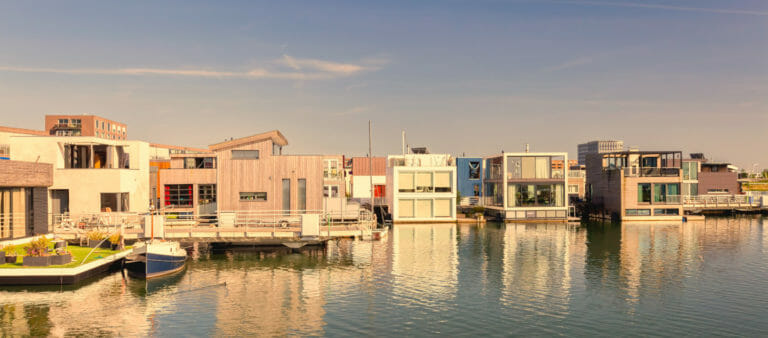
Imagine waking up in the morning with the sounds of waves lapping against the shore, and watching the sunset above the mountains as you enjoy dinner on your deck. If that sounds perfect to you, then you might consider a Floating Home! They are plentiful options around the world.
Here are 6 great things to remember if you’re considering making this move to your own floating home.
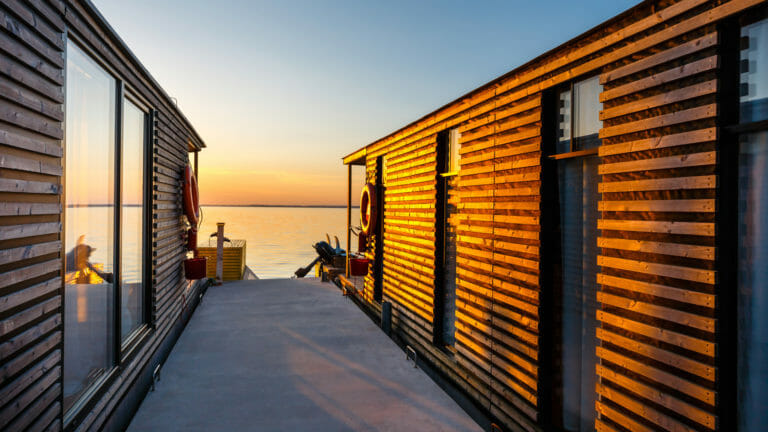
1. What is a floating home?
A Floating Home is a type of home that is built on a floating structure and floats on the water. Due to the unique structure of these homes, they require less maintenance because they are not directly connected to the ground. These homes can be found in areas that you wouldn’t usually find a home, such as in the middle of a lake and they give homeowners a new and unique way of living. Normally you can find them on riversides or other areas that have a tranquil and relaxing atmosphere.
2. What are the benefits of living on a floating home?
Floating homes are environmentally friendly
They reduce the requirement for further landscaping. Because floating homes are not attached to the ground, no trees or plants are destroyed during construction. They can be built from durable materials like concrete, steel, wood, or aluminum which do not require maintenance like painting or roof repairs after every storm. The floating house rises with or above the floodwater level and serves as a safe haven for animals in times of danger if there is flooding.
Floating home lifestyle is serene and tranquil
Due to being close to nature, the floating home lifestyle is a fantastic opportunity to get out of the hectic routine of today’s fast-paced world. The calming sound of splashing water in the waterways and the warmth from the sun reflecting off of the water makes it a great place to enjoy nature or just relax. Floating homes are aesthetically pleasing, too. They’re often built with their best side facing the water and many have awnings to give them a sense of being in a boat. These living spaces have been carefully crafted to maximize the view from every room in the house. The finest floating houses are those where you may watch the sunset on the horizon from your living area, bedroom, or even your rooftop balcony.

Floating homes are more affordable compared to traditional houses
The cost of building floating homes is lower than average because no foundation is required. This saves up to 30 percent of the total cost. Floating homes are also cheaper to maintain compared to traditional houses. The utilities such as hot water, electricity, and sewage disposal can be supplied from nearby land or through a barge. Floating homes can also serve as vacation rentals, which means they generate additional income for the owner of the house.
Supportive floating home community
Floating homes are usually found in communities where the residents live close to each other – allowing them to socialize more often. Floating homes owners share the same interests in boating, fishing, swimming, and being close to water in general. Floating home communities also do social activities such as community dinners and parties so that you can enjoy spending time with other owners. This allows the homeowner to enjoy the benefits of having a supportive community. It’s also easier to find help in case of an emergency.
Floating homes for those who lack access to land
Floating homes can be a great option for those who do not have access to land. In places where the population is dense, such as in cities, people don’t have enough room to build a traditional home. But with a floating home, you can enjoy the benefits of urban living while having a more spacious and comfortable home.
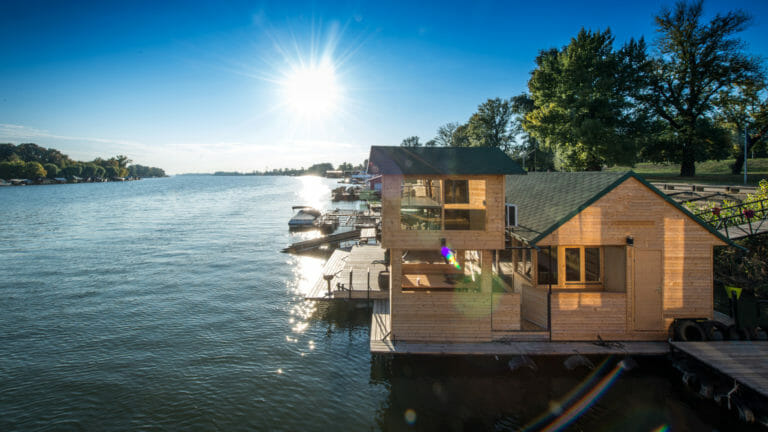
3. What are the disadvantages of floating homes?
If you’re considering buying a home that floats on water–whether it’s on an ocean, lake, or river—you might want to know the disadvantages before you invest. From cost to resale value, here are four downsides worth exploring if you’re thinking about living in this type of residence.
Selling Floating Homes is slow
Floating homes tend to be slow sellers. Because they are something special. They also tend not to appreciate much during good economic times since land values often appreciate faster than the construction materials used for floating structures.
They behave like a boat
A floating home can be unstable in high winds or storms. They also behave like boats, so if the water level is rising or falling, this affects your whole home. It can be difficult to insure a floating home unless you live in an area with constant water levels. And like in most boats you have minimal storage space for your items.
Not every floating home is equipped with everything you need
Some floating homes are not connected to electricity or the sewage system. In that case, you need your own generator and septic tank. That might be something you don’t want. Make sure the floating home has everything you need before moving in. Therefore you should make a list of things you can’t live without, things you don’t really need, and things you don’t need at all.
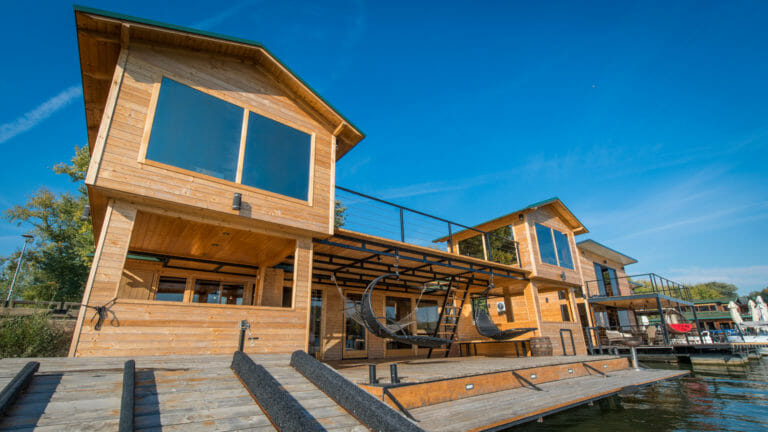
4. How can you find out if this lifestyle suits you?
The best way to find out if the floating home lifestyle suits you is to go on a trial. At least for two weeks. At the end of each day, take a moment and reflect on how it went. Did you feel fulfilled? Were your needs met? What would be different about your life if this was the new norm? If some parts felt off or overwhelming, consider what adjustments might make it work better for you. It’s important to go into this with an open mind and a willingness to experiment. There is no right or wrong way to live on the water, just your way!
This is part of what draws people in and also contributes to the difficulty of finding out if this is right for you. There’s no one way to live on a floating home – they can be as tiny or as large, luxurious or spartanly decorated, and stationary or constantly moving as you’d like them to be. For many people who are interested in living on the water, this is part of the beauty of it. Instead of having to conform to one lifestyle, you get to create your own! From there, it’s up to you to decide if that fits into your lifestyle.
Rent a Floating Home Before You Commit
If you’re still on the fence, consider renting a floating home for an extended period of time (one month minimum) before making any big decisions. It’s easy to understand how it works once you’ve spent some time living out your days on one. Remember that it takes some getting used to but don’t be afraid to speak up if you have a concern or idea about how it could work better for you.
The most important thing is that this life works for you, so take your time and enjoy the process! If it doesn’t feel right after a trial period or one month of living on the water (whichever comes first), then do what’s best for you and move on. There is a whole wide world of floating homes out there, waiting to be discovered!
5. Where can you find floating homes?
Floating Homes can be found in many different locations like the Netherlands, England and America.
In the Netherlands
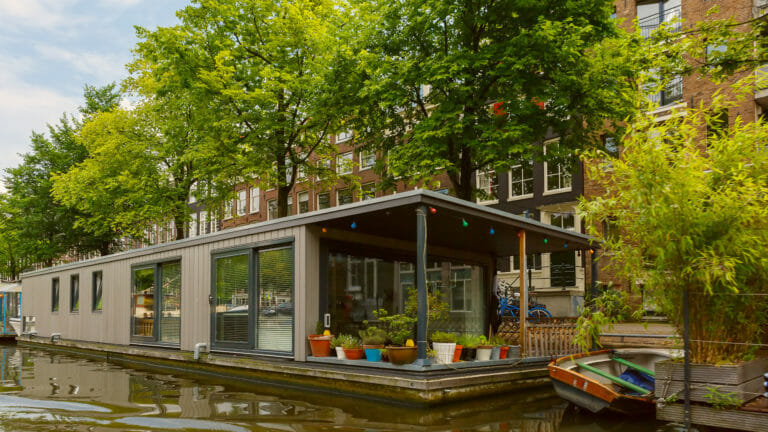
The Netherlands are known for their beautiful canals. Dutch people prefer to live on water and there are over 300,000 homes in the Netherlands that float on waterways. Some canal areas in Amsterdam and Rotterdam were constructed specifically with floating homes in mind. The reason the Dutch chose water living is because of the high price of land in The Netherlands. So, they chose to build homes into the water instead.
in England
The English are much like the Dutch when it comes to building on waterways. Houses are built moored near the bank of a river or canal, but not actually touching land. Many moored homes in England are built with boat shaped architecture.
in America
In America you will find a few floating home communities on canals or rivers. The houseboats are usually located near cities because there aren’t many places to build a floating home in areas where there are no rivers or canals. The homes often face away from the city because they want to enjoy the quiet and beauty of nature. America has floating houses located off the coasts of California, New Jersey and Florida or in Seattle. Floating homes are not just for rich people living in waterfront properties, they can be found in many different locations.
- California
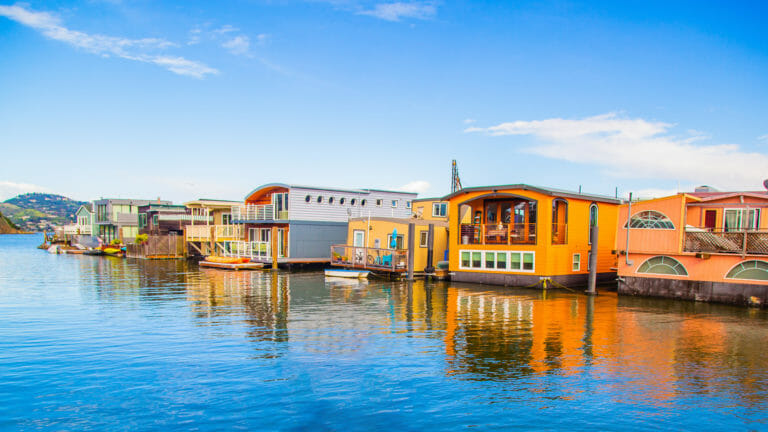
Californian residents can enjoy living in Floating Homes when they purchase a Floating Home. Some people prefer to live off the coast of California in Floating Homes, where they can enjoy their time on the water. There are several Floating Home Communities located off the coasts of California and who knows, maybe you’ll find your dream home there!
- New Jersey
Many Floating Homes have been built off the coast of New Jersey, where they have become popular homes to those who want to enjoy a Floating home living. Floating Homes off the coast of New Jersey have been around for a while and some can still be purchased.
- Florida
People who enjoy having their homes near the water, have chosen to live in a floating home community off the coast of Florida. There are several different home styles available including cottages, beach homes and luxury homes. If you’re thinking about purchasing a Floating Home be sure to contact your realtor for more information on purchasing a Floating Home in the Florida area.
- Seattle, Washington
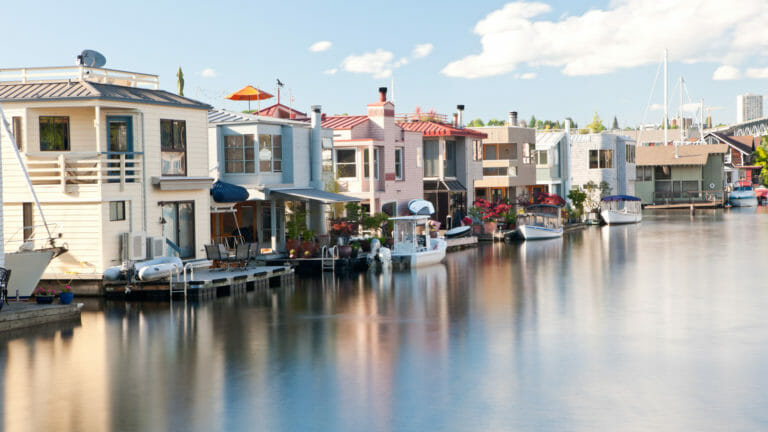
The Floating Homes of Seattle provide a unique waterfront home for people to live in. Living in a floating house in Seattle means that you can enjoy a more relaxed life on the water while being fairly close to nature. That is something most homes can’t offer.
These are just some places, they are available all over the world and living in a Floating Home can provide you with a unique lifestyle. Where will your floating home be?
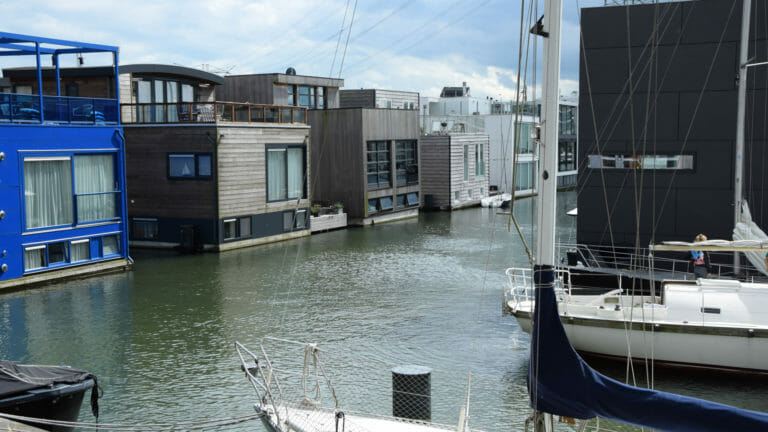
6. What is the Price Range of a floating real estate
Floating homes vary in price depending on their size and function. Due to their lack of proximity to major cities, most floating homes are outside major city limits or in small towns where real estate costs are lower than usual. As with any type of dwelling, the smaller it is (in this case “small” = less square footage) the cheaper it will be monthly bills-wise and vice versa. A large floating home that sits next to an expensive downtown area may cost upwards of $5 million USD while a spacious but simple one-bedroom floating home may cost as little as $200,000 USD. Floating homes are not limited by acreage either- you could have a modest 1,500 square foot floating home on a tiny lake to an extravagant 10,000+ square foot one with multiple amenities and bedrooms that sits on a body of water that spans several hundred acres.
Live like you're on vacation every day of the year
If you’re looking for a lifestyle that offers serenity, affordability and community but also has the convenience of living in an urban setting, then floating homes may be perfect for you. But before making any decision about purchasing or renting one of these units, make sure to try it out first. Floating homes sometimes don’t come with all the amenities like running water and sewage systems (although some communities offer both) so they can feel more like camping than city life at times. And because they tend not to sell quickly and usually aren’t available on short notice you’ll want to ensure that this is your dream home before taking the plunge into owning one!
